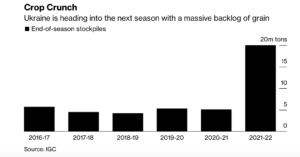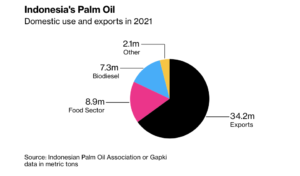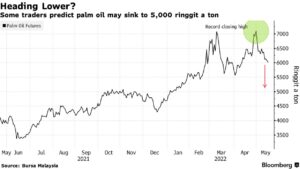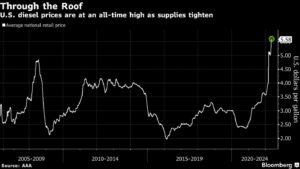Tariffs imposed by the Trump administration collected an estimated $958 million in revenue from selected agricultural inputs from February to October of 2025, according to North Dakota State University's monthly…
Russia Won’t Halt Black Sea Blockade; Indonesia Lifts Ban on Palm Oil Exports; and Diesel Prices Climb
Wall Street Journal writers William Mauldin and Vivian Salama reported in today’s paper that, “Russia dismissed calls from top United Nations and Western officials to halt a Black Sea blockade that has prevented Ukraine from exporting much of its grain to world markets, causing price hikes and exacerbating food shortages.
“Moscow’s ambassador to the U.N., Vasily Nebenzya, told a meeting of the U.N. Security Council on Thursday that rising food prices had been caused by Western sanctions against Russia and other factors, rather than the nearly three-month old war in Ukraine. He didn’t acknowledge calls to negotiate the shipment of grain from Odessa and other Ukrainian ports.”

The Journal article noted that, “Thursday’s meeting, presided over by U.S. Secretary of State Antony Blinken, pitted Moscow’s ambassador against senior Western officials and U.N. Secretary General Antonio Guterres.”
‘The decision to weaponize food is Moscow’s and Moscow’s alone,’ Mr. Blinken said. Twenty million tons of grain are sitting in Ukrainian silos as global food supplies dwindle, he said.
Mauldin and Salama explained that, “Mr. Guterres and U.S. officials are exploring another possible route for Ukrainian grain exports: north by rail from through Belarus to the Lithuanian port of Klaipeda, U.S. officials say. As an incentive for Belarusian leader Alexander Lukashenko, officials are exploring a six-month waiver of sanctions on the country’s potash fertilizer industry, U.S. officials said. Washington imposed the potash-related sanctions last year in response to Belarus’s engineering of a migration crisis and its crackdown on domestic political opposition.
“The Belarus rail route for grain—and other land and river routes under consideration in Europe—won’t be sufficient to move the millions of tons of grain Ukraine exports annually, experts say. Under current supply chains, shifting seaborne grain and sunflower oil exports to rail would only deliver 10% of prewar export levels, according to Sara Menker, chief executive of agriculture analytics firm Gro Intelligence. ‘It’s not enough,’ she told the Security Council on Thursday.”
Yesterday, Reuters writer Natalia Zinets reported that, “Ukrainian Foreign Minister Dmytro Kuleba thanked Egypt on Thursday for turning away a Russian ship loaded with grain which he said had been stolen from Ukraine.
“Egypt’s supply minister said on Sunday that a ship that had been allowed to sail by Russia had been turned away on the grounds that it did not have the proper paperwork.”
And a separate Reuters article yesterday, also by Natalia Zinets, reported that, “Ukraine has exported 643,000 tonnes of grain since the start of May, considerably less than during the same period of last year when it sold 1.8 million tonnes abroad, the agriculture ministry said on Thursday.”
“The ministry said May’s volume included about 617,000 tonnes of corn, 16,000 tonnes of wheat and 8,000 tonnes of barley. It did not say how the grain was delivered,” the article said.
Meanwhile, Reuters writers Rajendra Jadhav and Mayank Bhardwaj reported yesterday that, “India is likely to harvest 106.41 million tonnes of wheat in 2022, nearly 4.4% lower than the previous estimate, the farm ministry said on Thursday, as a sudden rise in temperatures during the grain maturity stage slashed yields.
“The world’s second biggest wheat producer was earlier projected to harvest a record 111.32 million tonnes this year. The reduction in output and more than 50% drop in government procurement prompted New Delhi to ban wheat exports on Saturday.”
In other developments, Bloomberg writer Eko Listiyorini reported yesterday that, “Indonesia, the world’s biggest shipper of edible oils, lifted a ban on palm oil exports in a move that will bring relief to the global market after the war in Ukraine choked off critical supplies.

“Palm oil exports can resume from May 23, President Joko Widodo said in an online briefing on Thursday. This is after considering improvements in local supply and prices, as well as the 17 million workers in the industry, he added.”

Bloomberg’s Eko Listiyorini and Pratik Parija reported yesterday that, “Palm oil has lost a major pillar of support after top producer Indonesia lifted a ban on exports, paving the way for prices to slump further as supply builds and demand languishes.”
Also yesterday, Bloomberg writers Kim Chipman and Megan Durisin reported that, “Farmers from Iowa to Ukraine are grappling with surging diesel prices and an unsteady supply, forcing them to spend unprecedented sums on fuel in a chaotic market and raising concerns about the autumn harvest.

“In the US, where corn and soybean producers are rushing to sow after rains and cold temperatures forced delays, filling a tractor tank daily now costs some farmers $1,000, twice what it was a year ago. And the most intensive part of the farming season is still ahead.”
The Bloomberg writers added that, “In fact, diesel is only one fuel problem. Propane has nearly doubled in price from last year. It is used to heat farmers’ homes and power dryers during harvest to reduce corn moisture and make the grain suitable for storage and sale.”
And Bloomberg writer Elizabeth Elkin reported yesterday that, “Farmers are still buying weedkillers and insecticides to ensure plentiful harvests despite soaring costs for such chemicals, according to manufacturer FMC Corp.
“Prices have been rising as the pandemic, Russia’s invasion of Ukraine and other supply chain issues have tightened the market. But farmers are also fetching the best prices in years for their crops, so demand for chemicals is ‘very strong,’ FMC’s Chief Executive Officer Mark Douglas said.”





